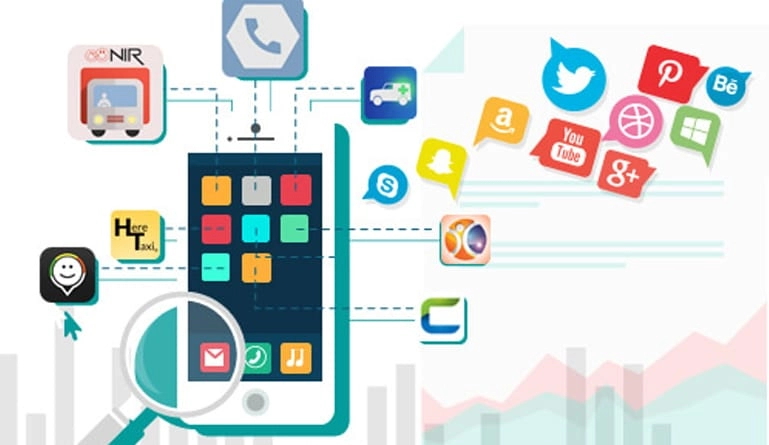
According to Zenith’s Mobile Advertising Forecasts 2018, 66% of individuals in 52 key countries will own a smartphone by the end of 2018. The rapid expansion of smartphone ownership across the globe has transformed the way businesses connect with their consumers. The massive success of consumer mobile apps has resulted into the trend that many companies now want to go for enterprise-grade mobile app development to expand their business applications, improve customer services, and enhance the efficiency of the workforce.
Gartner emphasizes that through 2021, “market demand for app development will grow at least five times faster than the IT capacity to deliver it.” This growing demand has an equal number of challenges to offer in the path of mobile app development. This article covers significant challenges faced by the developers and companies along with the ways that can be used to deal with them.
Let’s First Understand the Areas that Majorly Face the Challenges
1. Mobile App Development Approach
2. Variety of Platforms and Devices
3. App Marketing
4. Customer Reviews and Experience
5. App Performance
6. Integration Challenges
1. Mobile App Development Approach

Mobile app development starts with the selection of the best approach from a plethora of available choices. After all, it is essential for a business to commence on the right foot. You are offered with a wide array of development frameworks and platforms, which is an equally challenging decision. It is vital for you to ensure the correct development approach right from the beginning. In addition to this, you also need to pay attention to the nature and goals of your business to decide whether to go for hybrid app development, a native app development, or just the web-based mobile app development. The next goal, after this, will be to strategize the UI/UX requirements, besides others. Hence, begin with proper research, analysis, and implementation of the ideas to proceed in the right direction.
2. Variety of Platforms and Devices

Every business wants to deliver an impressive experience to its users. Device compatibility is one of the most crucial issues in this respect. A user has a wide array of options to consider when it comes to the platforms and devices over which they access the mobile apps. These choices include iPhones, Android Smartphones, Windows devices, tablets like iPads, and desktops that again might run on Windows, Linux, or Apple OS. For a business app to gain popularity and drive results, it must work seamlessly across the platforms and devices regardless of their size, screen resolutions, and pixel densities. This is one of the critical development challenges that need to be addressed with great care.
3. App Marketing

According to Statista’s research to find out the number of published apps in the leading app stores in the first quarter of 2018, Google Play store offered close to 3.8 billion apps to the users while Apple users could choose from 2 million apps. This is what makes the competition more stringent for the businesses who now need to work harder and smarter to beat the competitors. Every quarter introduces many useful apps that soon lose their hold in the market. Hence, it is not sufficient for an app to be just good, they need to be successful and should have the potential to create a long-lasting impression to generate revenue.
Hence, while strategizing, ensure that you make an app that has the potential to win the trust of its users. Follow this by implementing a tailor-made marketing plan including PRs and media planning, social and viral marketing, and of course the effective App Store Optimization.
4. Customer Reviews and Experience

App reviews are one of the potential sources for promoting mobile apps. It is a comprehensive way that targets new users by introducing your app’s potential to them, the developers by introducing the pros and cons, as well as the current users by allowing them to express their views about your app openly. Reviews also establish your credibility. A negative review can influence another user’s decision to download.The key to getting maximum positive reviews is to make your app as simple and user-friendly as possible. While you are developing a mobile app for your business, understand that the app is intended to be used by the users and not by your team or by yourself. Hence, you should have an in-depth knowledge of your target market and types of users. Do not introduce complex processes and navigation to your apps unnecessarily. That would only lead to a rise in negative customer reviews which will, in turn, affect the number of downloads and lead to a loss of users. Keep the app as simple as possible. Include helpful resources in the app store introduction such as videos, images, doc files, thumbnails, and icons that emphasize more on the user experience to increase downloads.
5. App Performance

Besides other challenges, app developers also face the challenges in terms of ensuring bug-free or crash-free mobile app operation. Also, the app should consume less space in the device without affecting its battery life. In other words, the app should not compromise on any aspect of the performance. These aspects of an app should be taken care of in the initial phase of development through expert designing and compatibility checklist. This can be followed by intensive testing of the mobile app and then once it satisfies all the criteria of performance, only then you should proceed to deployment.
6. Integration Challenges

Developers are the ones who often face integration challenges. It is an essential part of the successful mobile apps to integrate and synchronize with multiple types of SQL databases and back-end databases. This challenge can easily be addressed by using advanced development tools.
How to Deal with Mobile App Development Challenges?
Brands in the mobile app development industry are overcoming the challenges through the practical use of rapid app development tools. These tools foster the development of sophisticated, full-fledged web, hybrid, and native business apps in less time as compared to the traditional methods. They also significantly reduce the efforts by decreasing the amount of coding. Some of the platforms also offer WYSIWYG design architecture to enable quicker and precise development with a great user interface. This mode of the application further automates a significant portion of the process such as default information and files. Matellio’s mobile app development experts emphasize that apps should be primarily developed through the implementation of multi-level selection processes instead of coding. In addition, development should be concocted by an extensive range of actions and routines to foster more convenient and swift development.
Conclusion
The challenges in the mobile app development ecosystem are as widespread as the number of competitors you have to beat. As a business decision maker, you, along with the expert team of mobile app developers need to ensure that you challenge every obstacle while working according to a perfect game plan. There have been businesses that failed because they couldn’t meet these challenges, or did not offer the audience with the perfect combination of features they wanted. Hence, address these obstacles carefully through proper planning and implementation to make a long-lasting impression and monetize your efforts in an effective way.



